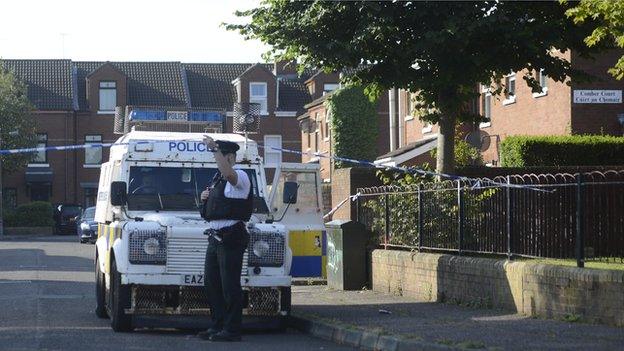Stormont crisis: DUP ministers in assembly quit threat
- Published
Peter Robinson said "DUP ministerial resignations will follow immediately" if the Assembly is not suspended
The DUP has said if the Northern Ireland Assembly is not adjourned or suspended their ministers will quit, amid an IRA row.
DUP leader Peter Robinson warned that it could happen within 24 hours.
However, Sinn Féin's Martin McGuinness said he had been assured by David Cameron that he would not suspend the assembly.
Doing so, said Mr McGuinness, would be "a grave mistake".
A political crisis has been sparked in Northern Ireland following the murder of former IRA man Kevin McGuigan Sr. Police have said they believe IRA members were involved in the shooting.
Sinn Féin has denied this and maintains the Provisional IRA no longer exists.
The PSNI chief constable also said there was no evidence that the killing was sanctioned by the organisation.
On Wednesday, well-known republican and northern chairman of Sinn Féin Bobby Storey was one of three men arrested over the murder.
Speaking at a press conference later that day, Mr Robinson said: "If we can't stop the assembly by way of adjournment or suspension then we will take the step that will cause it to be brought to an abrupt halt."
He said his party had sought a recall of the Northern Ireland Assembly's business committee on Thursday.
If the DUP could not secure an adjournment of the assembly at that meeting or if the Northern Ireland Secretary would not suspend the assembly, then DUP ministers would stand down, he said.

The Stormont Business Committee
The business committee at Stormont has 10 members drawn from the five main parties, is chaired by the speaker and includes party whips.
It generally meets once a week in private while the assembly is sitting.
Its main function is to consider what business is to be scheduled for assembly plenary sessions, held on Monday and Tuesday.
The current speaker is Sinn Féin's MLA Mitchel McLaughlin and it is the speaker who has the power to allow a recall of the committee.
Unlike important votes in the assembly, votes on the business committee do not require cross-community support, but straight majorities.
Committee members cast their votes in proportion to their parties' strengths in the assembly. For example, DUP members wield 38 votes representing the number of MLAs in the assembly group.
Last week, the DUP's request for an adjournment of the assembly was rejected because it only won support from the Alliance Party and was therefore outvoted by the combined votes of the SDLP, Sinn Féin and the UUP.

Mr McGuinness said he had spoken to both Mr Cameron and to Taoiseach (Irish Prime Minister) Enda Kenny. Both were against any suspension.
His party, he said, had taken a strong stance against "violence, criminality and those who would attempt to drag us back to past".
Martin McGuinness said suspension would be "a grave mistake"
"We're not going to jump to the tune of the inter-party rivalry that's being played out between both unionist parties at this time," he said.
"I think it would be a grave mistake from the British government to suspend these institutions. I think it would send a very negative message.
"Not only do all the politicians have a duty to provide strong, positive and decisive leadership, that must also be provided by the British and Irish governments."
Meanwhile, BBC Political Editor Laura Kuenssberg said a source close to the talks called the situation at Stormont "very precarious".
"It's thought 'highly unlikely' the DUP will be granted the adjournment of the assembly they seek, leaving the British government with a choice to suspend the assembly or continue with a situation described as a 'farce', if DUP ministers quit as they have threatened to do," she said.
The source suggested the adjournment the DUP is asking for is merely a "gesture" but that if they follow through on their threat to walk out if it is not granted, the UK government would have little choice but to suspend the assembly "if it goes into paralysis".
Political talks to try to resolve the crisis are taking place without the Ulster Unionists, who said they would not take part unless the status of the Provisional IRA is resolved.
The UUP said it would not return to the talks unless the IRA issue was top of the agenda.
Speaking after the DUP statement on Wednesday, UUP leader Mike Nesbitt said it was up to Sinn Féin leader Gerry Adams to admit that the IRA existed.
"Gerry Adams has to admit that the IRA exists with a structure, without that, it is all bluster," he said.
"Nothing is going to work unless Gerry Adams is honest about the IRA in 2015. It is now over to Sinn Féin."
Alliance party leader David Ford has called on other parties to "stop and think" before jeopardising the power-sharing institutions permanently.
Mr Ford said: "Alliance is exploring a number of options regarding the future of the Assembly in order to allow parties to take a step back and participate in talks in a calm manner."
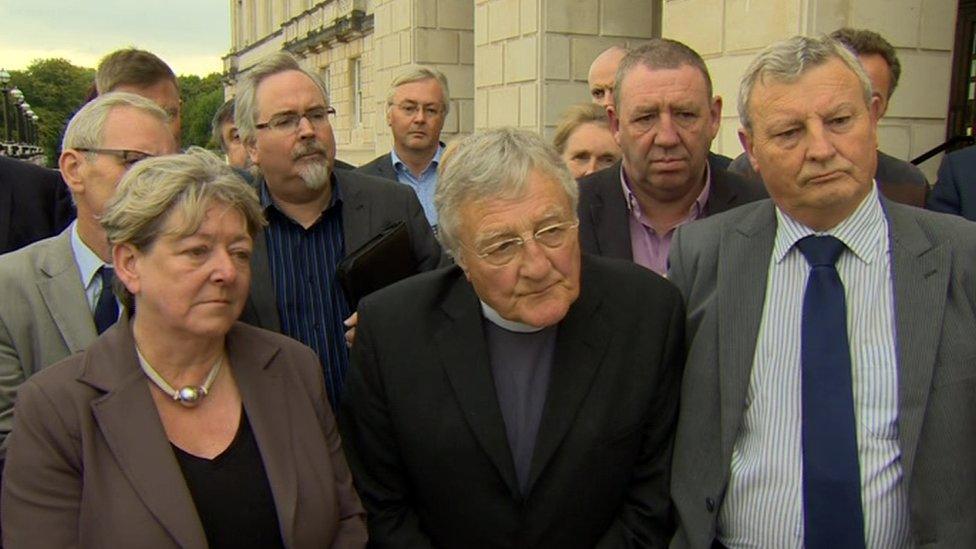
Rev Harold Good was among civil leaders calling for the crisis to be settled
A delegation representing business, churches, unions and the voluntary sector were also at Stormont to call on political leaders to settle the crisis.
Reverend Harold Good, who witnessed IRA decommissioning during the peace process, said: "We are demanding of our politicians that they work at this until they get it sorted because we cannot afford to have our institutions collapse.
"We could be back to square one."
- Published9 September 2015
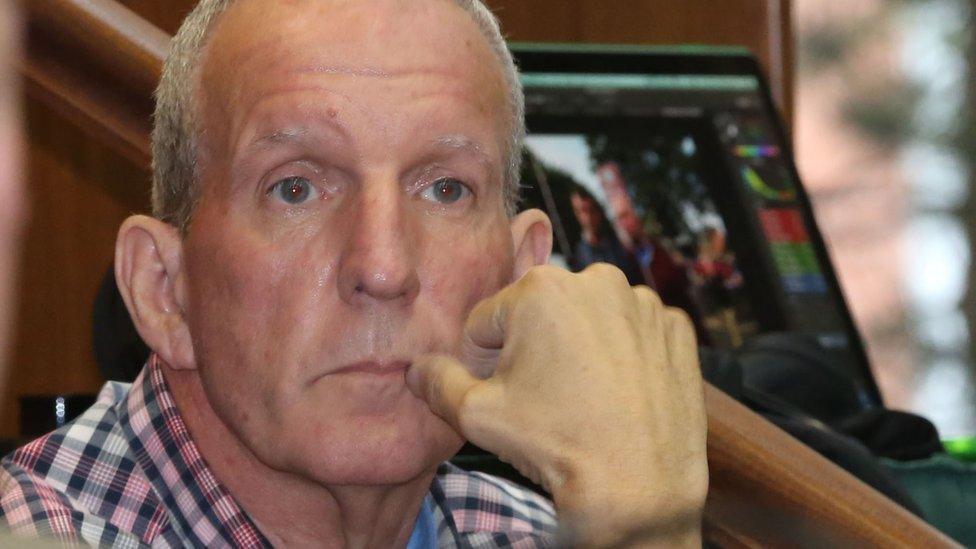
- Published8 September 2015
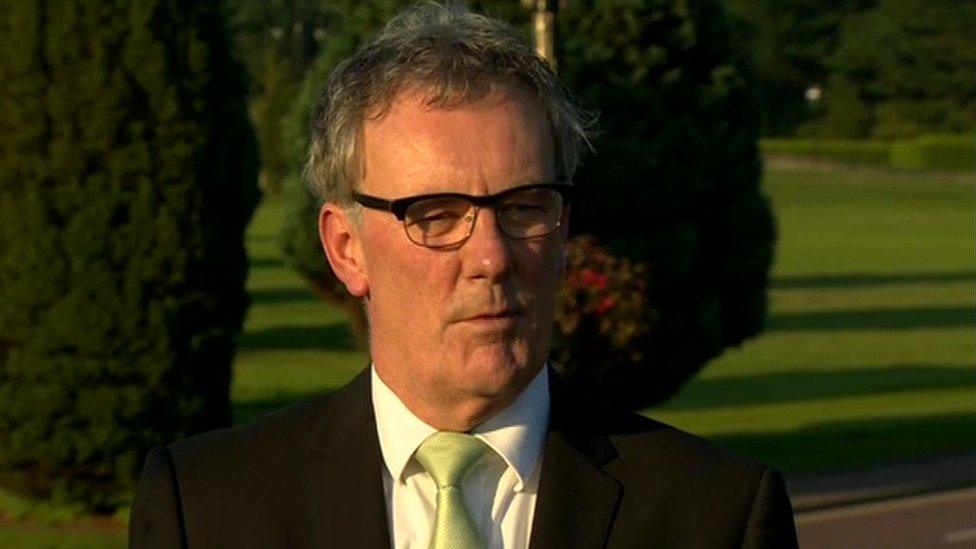
- Published20 August 2015
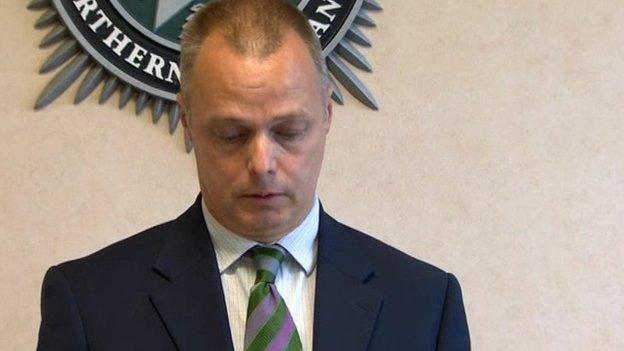
- Published13 August 2015
